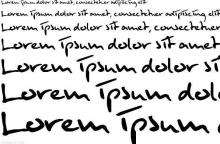September 21, 2009 weblog
The Handwriting of Liars

(PhysOrg.com) -- Forget about unreliable polygraph lie detectors for identifying liars. A new study claims the best way to find out if someone is a liar is to look at their handwriting, rather than analyzing their word choice, eye movements and body language.
The study by Gil Luria and Sara Rosenblum from the University of Haifa in Israel, tested 34 volunteers, who were each asked to write two stories using a system called ComPET (Computerized Penmanship Evaluation Tool), which comprises a piece of paper positioned on a computer tablet and a wireless electronic pen with a pressure-sensitive tip. Using the system, the subjects wrote one paragraph about a true memory, and one that was made up.
The researchers analyzed the writing and discovered that in the untrue paragraphs the subjects on average pressed down harder on the paper and made significantly longer strokes and taller letters than in the true paragraphs. The differences were not visible to the eye, but were detectable by computer analysis. There were no differences in writing speed.
The scientists suggest that handwriting changes because the brain is forced to work harder since it is inventing information, and this interferes with normal writing.
People hesitate when they lie, Dr Richard Wiseman, a psychology professor at the University of Hertfordshire told the Daily Mail, and some companies use this knowledge to check how long people take to tick boxes in online surveys. The new research is promising, he said, but needs larger scale testing.
The study was published in the Applied Cognitive Psychology journal. Research is in its early stages but ComPET could one day find practical application in testing the truthfulness of handwritten insurance claims or loan applications, or in handwriting tests during job interviews. Handwriting analyses could also be combined with lie detectors to identify whether or not people were lying.
More information: Comparing the handwriting behaviours of true and false writing with computerized handwriting measures, Applied Cognitive Psychology, DOI: 10.1002/acp.1621
© 2009 PhysOrg.com

















